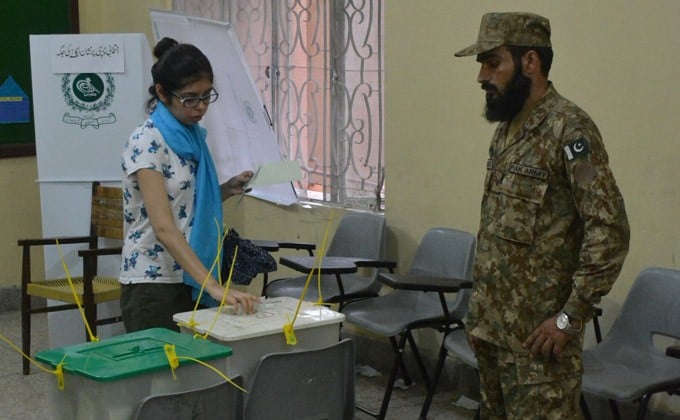
The traditional elite and corporate elite have locked horns to stay relevant in power game

Imran Khan has reached the Prime Minister’s House and awaiting the keys to the door. That will depend on the independents or one or more smaller parties. That there was a PTI wave was obvious. The other parties are crying foul. That is to be expected. It needs to be admitted though that, despite myriad complaints - genuine in many constituencies - the elections were by and large orderly and fair across the country. Balochistan, though, is a different story.
Accepting that elections were orderly and fair on election day does not mean denying that they were not engineered. The engineering started from the time the Panama off-shore accounts story broke. In the process, the courts were pressed into service, reviving memories of judicial infamy in 1958 and in 1977. The hollowness of judgments against Nawaz Sharif and their timing will stand as a testimony to the perversion of justice in Pakistan. The media too was corralled, with a few brave souls brought to heel with uncharacteristic heavy-handedness.
Essentially, the deep state’s propaganda factory that had been in full play for over three decades in demonising the Bhutto family, now went into action against the Sharifs. At the same time, all matters that could hurt Imran Khan’s political image were assiduously kept out of the courts and the media. A popular narrative was created against Nawaz Sharif and for Imran Khan. Of course, the Sharif and Zardari governance track records stood up against them and helped Imran Khan pull off a genuine victory.
The results of the election and the machinations behind it can now be treated as historical facts. The question that arises is why did the deep state that had mid-wifed Nawaz Sharif’s political career from the 1980s onwards, created a spurious political alliance - the Islami Jamhoori Ittehad (IJI) - in 1988 to prop him up, and handed him a two-thirds parliamentary majority in 1990 now turn against him? The answer perhaps lies in the shifting political sands in Punjab.
For all of seven decades since independence, Punjab has been the ruling power in the country, thanks to the sheer dominance of the province in the military and the bureaucracy. All along, the Punjab elite -- over-represented in all corridors of power -- has been united in terms of domestic and foreign policy that the state has pursued. Primarily, the hawkish policy vis-à-vis India enabled the deep state to create a security state paradigm that in turn enabled the military-bureaucratic-landowner-business/industrialist sections of the Punjab elite to lay premium claims on national resources. In other words, the security paradigm framework served their core interests.
This unity no longer holds. The last two decades have seen the rise of a corporate elite in Punjab, with interests sharply at variance from the traditional elite. It commands a growing capital base and seeks investment opportunity abroad. It does not as yet possess the entrepreneurial and managerial capacity and sophistication to compete internationally. However, it sees opportunity in neighbouring India - and finds the state’s security paradigm blocking its way.
Nawaz Sharif and his PML-N have come to represent Punjab’s corporate elite. His repeated attempts to reach out to India whenever he has been in power, even if for a short a period, testifies to his attempts to normalise relations. Notably, each of his attempts has been frustrated by the deep state, the most notable one being the Kargil episode.
Clearly, the corporate elite is now increasingly at odds with the traditional elite. The conflict of interest arises from the fact that the corporate elite sees profits in improved relations with India in terms of trade and investment opportunities. However, any such rapprochement would rob the traditional elite in the deep state of the basis and reasoning and the very logic of priority in claims on the budget. Thus, the threat from Nawaz Sharif and the need to neutralise him.
As an aside, it may be said that the current campaign against Nawaz Sharif is a product of intra-Punjab conflict. The other provinces that have historically challenged the power structure and generally found Punjab wanting - for example, during the MRD struggle in 1983 - are now peripheral spectators. It goes to the discredit of Nawaz Sharif, the PML-N and the corporate elite that they have failed to take the other provinces on board.
To return to the elections and the PTI’s victory, the current round has handed victory to the traditional elite in the deep state. However, the corporate elite is not a transient phenomenon. It has a strong base in terms of resources and leadership. And it is rooted in Punjab. That it will continue to assert itself is inevitable. That it will at some stage in the course of a year or so force Imran Khan’s hands is also inevitable.